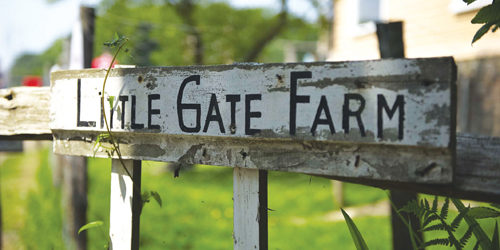
Little Gate Farm in East Sussex, provides an innovative programme to get learning disabled adults out of day care and into employment, thus into the community. The farm acts as a stepping stone into real employment working on four skill levels:
1. Independence
2. Confidence
3. Communication
4. Work skills
Once these skills have been achieved, the ‘ranger’ as the service users are known, are employable. The farm is then able to approach an organisation, with the aim of them to employ the ranger with the full support of a ‘job coach’ - a scheme known as The Supported Employment Scheme.
Initially, the job coach would visit the place of work, assess what needs to be learnt and makes any physical adjustments if needed. The job coach would then work closely with the organisation during the induction period, supporting the ranger throughout and also give the ranger travel training, whilst working closely with the families involved. This is a free service and is no harder than introducing any other employee to a new work place.
So, I hear you say: “I’d be doing a great thing helping an adult with additional needs and I’ll probably go to heaven as a result, but I am running a business here! How would this scheme benefit my organisation?”
Well, according to Claire Cordell who runs Little Gate Farm, not only would you get invaluable support from the job coach, but the rangers tend to be incredibly reliable and are happy to undertake more mundane tasks that others may not want to do, or do not have the time for. They often thrive on repetitive tasks and their presence creates a happier and more compassionate organisation. Moreover, it doesn’t cost anymore than the minimum wage.
I had to see this for myself and so I went along to meet accountant Mark Law, and business manager, Bryan Larkin, who employ a young man full time at MVL Business Services, an accountancy firm in Battle. I simply asked them “why?”.
Mark told me that he wanted to put something back into the community. He needed to take someone on to undertake administrative tasks, but once trained, these kinds of staff often want to move on into accountancy, but their recent Little Gate employee seemed happy to stick to the role.
The ‘ranger’ came to MVL for taster days, which were a huge success and as a result they were gainfully employed, with the job coach being just a phone call away if needed.
Mark added: “Our employee from Little Gate Farm has enhanced enthusiasm, and puts some previous applicants to shame. For the job he’s doing, he’s perfect and has lifted a huge burden from the other members of staff.”
Bryan added that recruiting decent staff these days is hard. He said: “There are very few applicants; a lot are sent by the job centre and they’re just not interested. Others come through a recruitment agency but depending on the quality of the agency, you sometimes receive about twelve CVs, and then you have to pay a fee. The third way is through people you know. Rather than a fee, this way round you get a helping hand.”
So all in all, the Supported Employment Programme gets a big thumbs up from MVL. In fact, they are so pleased they have just taken this employee on full time.
There are lots of myths surrounding the idea of employing an adult with additional needs and I’d like to dispel some of these.
Myth 1
I can never fire an adult with additional needs.
WRONG - your rights as an employer remain the same.
Myth 2
It will cost me more.
WRONG - it will cost you the minimum wage.
Myth 3
There is a health and safety risk.
WRONG - all health and safety needs are put into place by the job coach, free of charge to you.
Myth 4
Adults with additional needs cannot work in an office environment.
WRONG - some are suited to office work, some are not, just like you and me.
Myth 5
I’ll have no support and won’t know what to do.
WRONG - you will always have the support of the job coach for whenever help is needed.
Myth 6
There is an insurance implication.
WRONG - no more than for any other employee.
Myth 7
I’ll only find an employee with a low skill set.
WRONG - all rangers come with a different skill set, just like you and me.
I wanted to further explore the situation of another ranger doing a completely different job and so I found myself in the warm and inviting office of Titleworth, a Dementia Care Home in Bexhill. Here, the organisation employs no less than four members of staff from Little Gate Farm, enjoying roles in the kitchen, maintenance, the dining room and even caring.
I met with Chris Turnball, Head of Clinical Services and Roy Carley, Business Manager. We talked mostly about a young lady who has been employed the longest. Initially the organisation’s aim was to support the community and help someone get into work, but the employers were so delighted with this lady, who started as a dining assistant, that she has now become an exceptional carer.
Chris said: “Some of us have lost the work ethic but Little Gate employees have it. Don’t think of the rangers of Little Gate Farm to be any different. They come with their own strengths and weaknesses, the same as any other applicant.”
Roy’s added: “You need to give them a chance and see that they are no different; in fact they could be more beneficial to your company because of their commitment and desire to work.”
There you have it; two huge success stories proving that not only would you be doing a wonderful thing for someone who really wants to work, but your organisation could truly benefit.
Still not convinced? Allow me to give you one more nugget of motivation. If you employ an adult with additional needs, then you would save the tax payer around £12,000 a year. This is how much it costs per year to keep an adult in a day centre.
For further information please call Little Gate Farm on 01797 260125 or email contact@littlegatecarefarm.co.uk to find out more.
www.littlegatecarefarm.co.uk/






